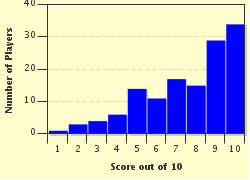Quiz Answer Key and Fun Facts
1. Although referred to as "essays", "An Essay on Criticism" and "An Essay on Man" are poems written entirely in heroic couplets, such as "A little learning is a dangerous thing; / Drink deep, or taste not the Pierian spring". What author of these two poems, despite being discriminated against in his own time for his Catholicism and physical deformities, is now considered one of the greatest poets in the English language?
2. This writer of prose went bankrupt as a merchant in 1692 while owing £17,000 and did not publish his first novel until 1719, when he was nearly sixty years old. Who was this author who helped lay the foundation for novel writing in English with such works as "Captain Singleton", "Moll Flanders", "Colonel Jack", and "Roxana"?
3. Which 18th-century writer was so talented that he crossed the barrier of different genres with poems like "The Vanity of Human Wishes", fiction like "Rasselas", and non-fiction like "A Dictionary of the English Language" but retired from writing in his early fifties when he received a pension, claiming that "no man but a blockhead" ever wrote for any other reason than to make a living?
4. In 1759, the first two volumes of Laurence Sterne's masterpiece appeared. What is the name of this experimental novel that parodied the way novels were written with such techniques as an entire page that is entirely blackened out, the positioning of Chapters 18 and 19 after Chapter 25, and the narrator's constant interruptions of the story with ridiculously lengthy asides?
5. In 1749, Henry Fielding published a novel about an orphan who relies on his wits to survive in a world corrupted by class warfare, hypocrisy, and greed. What is the name of this book, which includes the characters Master Blifil, who through his deceptive piety and greed attempts to steal the hero's inheritance, and the Man of the Hill, a recluse who represents the temptation to retreat from society rather than face its discrimination and cruelty?
6. Oliver Goldsmith wrote perhaps the most enduring play of England's eighteenth century. The lead male character, Charles Marlow, is extremely shy around ladies of the upper class but quite forward around other women; thus, Kate Hardcastle, a country gentleman's daughter, pretends to be a maid to gain Marlow's interest and affection. What is the name of this drama that revolves around the humor of several mistaken identities?
7. During the 1700s, biography was becoming more and more of an art form, particularly because of the accomplishments of the writer of such works as "Journal of a Tour of the Hebrides". Who was this author who gave up a law practice in Scotland to move to London to work on "The Life of Samuel Johnson" while struggling with alcoholism and depression?
8. Which poet, whose work serves somewhat as a bridge between the neoclassical poetry and that of the Romantic age, wrote the following lines in "Ode on the Death of a Favorite Cat": "From hence, ye beauties, undeceived, / Know, one false step is ne'er retrieved, / And be with caution bold. / Not all that tempts your wandering eyes / And heedless hearts is lawful prize; / Nor all that glisters gold"?
9. Most recognize the name of Jonathan Swift for his masterful "Gulliver's Travels" and "A Modest Proposal". However, what is the name of his satirical work that ridicules three divisions of Western Christianity through a narrative of three brothers--Peter, Martin, and Jack--who represent Catholicism, Anglicanism, and Calvinism respectively?
10. You may have noticed on the side of some Trivial Pursuit boxes the quotation "What mighty contests rise from trivial things". The line was composed by Alexander Pope. However, from what poem of his does this line come, a poem that includes a battle of cards between the aristocratic Belinda and the Baron, among others?
Source: Author
alaspooryoric
This quiz was reviewed by FunTrivia editor
agony before going online.
Any errors found in FunTrivia content are routinely corrected through our feedback system.

